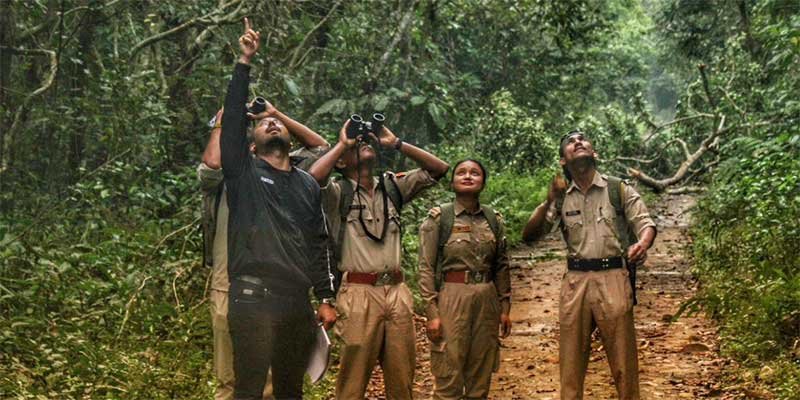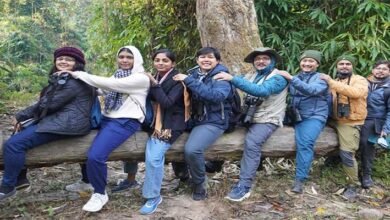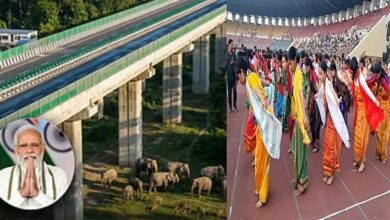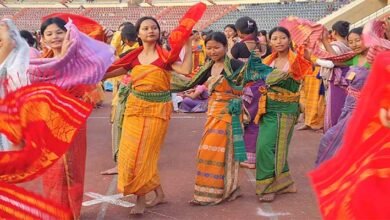Assam: Aaranyak organises Field-based training for forest staff on conservation of Hoolock gibbon
This training course which was organised for 30 forest guards, foresters and range officers was week-long and residential.

GUWAHATI- Research-driven biodiversity conservation organisation Aaranyak , successfully completed a week-long training programme on Hoolock gibbon conservation in Assam.
The field-based training which was initiated on March 28 at the Gibbon Conservation Centre of the Hoollongapar Gibbon Wildlife Sanctuary in Jorhat was organised in collaboration with Jorhat Forest Division of Assam Forest Department with support from The Habitats Trust, IUCN SSC Primate Specialists Group, and IUCN Primate section of small apes.
The objective of the training is to carry out research, training and conservation activities in Northeast India for the conservation of threatened Hoolock gibbon. Notably, the Western Hoolock gibbon (Hoolock hoolock) is the only ape of India. It is an endangered species and distributed in northeast India only. Their distribution in India is limited to the seven states of northeast India on the southern bank of the Dibang – Brahmaputra river system.
Also Read- 4-Year-Old Dead, 2 Missing After Boat Capsizes In Brahmaputra River
This training course which was organised for 30 forest guards, foresters and range officers was week-long and residential. A wide range of related topics were covered including, biodiversity in Northeast India and conservation, Primates Conservation in Northeast India with special reference to Hoolock gibbon, Gibbon Census or Population estimation, Gibbon Data collection, maintaining & reporting, Techniques of Floristic study, Gibbon habitat characteristic and Restoration, Population and Habitat Monitoring, Gibbon rescue and rehabilitation, Global Positioning System & use in field, and Legal Orientation (Wildlife Laws and its application).
“Unfortunately habitat fragmentation and hunting are the major threats to gibbons in India. Added to this situation is the lack of basic information and poor conservation awareness about the species in different sections of the people including the frontline staff, which is yet another major hindrance in the conservation of the species”, says conservation scientist in Aaranyak Dr Dilip Chetry.

“This course had provided participants with an initial understanding of the basic principles of primatology, experience with the methods and techniques used in field research. The course consists of daily lectures and field exercises.”, Dr Chetry added.
The training programme was inaugurated by Nandha Kumar, IFS, Divisional Forest Officer of Jorhat Forest Division. Dr Dilip Chetry, Head of the Primate Research & Conservation Division of Aaranyak, made a request to the trainees to make use of this training to enhance their knowledge of conservation of Hoolock gibbon in particular and biodiversity in general. Inauguration session was also addressed by Animesh Medhi, Range officer of Mariani.
Also Read: It should be tit-for-tat, Himanta on China renaming Arunachal areas
During the training, Dr I.C. Baruah from Assam Agricultural University, Dr Prabal Sarkar from University of Science and Technology Meghalaya, Ajoy Kumar Das, of Guwahati High Court, Gunin Saikia, Former Deputy Conservator of Forest, Nandha Kumar, IFS, Divisional Forest Officer, Jorhat Division, Animesh Medhi, Forest Range Officer, Mariani Forest Range, Mridu Paban Phukan from Wildlife Conservation & Study Centre, and Aaranyak’s Arup Kumar Das, Akshay Upadhyaya, Simanta Medhi and Dr Dilip Chetry trained the forest officials.
On April 2, the convocation of the training was held. The chief guest of this occasion was Nandha Kumar, IFS, DFO, Jorhat Forest Division. Kumar thanked Aaranyak for conducting the training at much needed time. He also requested Aaranyak to assist Assam Forest Department in primate conservation initiatives through various measures. The training manuals, books, Posters, certificates, and stickers and other study material were distributed among the trainees.









